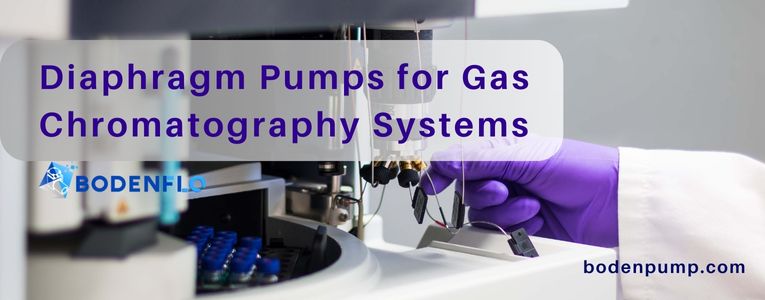
Gas chromatography (GC) and gas chromatography-mass spectrometry (GC-MS) are critical techniques used in analytical chemistry, environmental monitoring, pharmaceuticals, and industrial quality control. The accuracy of these systems depends heavily on stable and contamination-free gas flow. Choosing the right pump is crucial to ensure precise analysis and repeatable results.
Micro diaphragm pumps provide clean, low-pulse gas flow essential for gas chromatography and GC-MS applications. Their oil-free design eliminates contamination risks, making them ideal for high-precision analytical instruments.
As a manufacturer specializing in precision micro pumps, BODENFLO understands the challenges of maintaining stable carrier gas flow in GC and GC-MS systems. In this article, I will explore why micro diaphragm pumps are the best choice for these applications and how they outperform other pump technologies.
What Makes Micro Diaphragm Pumps Ideal for Gas Chromatography?
Gas chromatography relies on a steady carrier gas flow to transport the sample through the column. Any fluctuation in gas flow can affect separation efficiency and result in inaccurate readings. Micro diaphragm pumps offer several advantages over other pump types:
- Oil-Free Operation – Unlike rotary vane pumps, micro diaphragm pumps do not require lubricating oil, eliminating the risk of hydrocarbon contamination.
- Consistent Flow Rate – The low-pulse operation ensures precise carrier gas flow control, improving analytical accuracy.
- Compact and Lightweight – Their small footprint makes them perfect for integration into portable and benchtop GC and GC-MS systems.
- Low Maintenance – With fewer moving parts and no oil changes required, micro diaphragm pumps reduce maintenance costs and downtime.
How Do Micro Diaphragm Pumps Improve GC and GC-MS Performance?
1. Elimination of Contamination
One of the biggest concerns in gas chromatography and GC-MS is contamination from oil vapors or particles, which can compromise sample integrity. Traditional pumps, such as rotary vane pumps, use oil for lubrication, increasing the risk of contamination. Micro diaphragm pumps operate without oil, providing ultra-clean gas flow essential for precise GC analysis.
2. Stable Carrier Gas Flow
GC and GC-MS analysis demands a consistent and controlled carrier gas flow. Variations in pressure or flow rate can lead to poor peak resolution and unreliable results. BODENFLO's micro diaphragm pumps are designed for precision, ensuring a steady and low-pulse gas supply, which enhances analytical accuracy.
3. Compatibility with GC-MS Systems
Mass spectrometry applications require ultra-pure carrier gases and vacuum stability to ensure accurate ionization and detection. BODENFLO's advanced diaphragm pump models are engineered to handle the stringent requirements of GC-MS instruments, providing:
- Chemically resistant materials for handling different carrier gases.
- Low vibration and noise for stable instrument performance.
- Compact designs for seamless integration into analytical equipment.
4. Long-Term Cost Savings
While some pumps require frequent maintenance and part replacements, micro diaphragm pumps are built for durability. With wear-resistant diaphragms and high-quality materials, these pumps offer extended service life and lower operational costs compared to oil-sealed alternatives.
How Do Oil-Free Diaphragm Pumps Compare to Other Pump Technologies?
| Pump Type | Oil-Free? | Contamination Risk | Maintenance | Flow Stability | Noise Level | Suitable for GC? |
|---|---|---|---|---|---|---|
| Diaphragm Pump | ✅ Yes | None | Low | High | Low | ✅ Best Choice |
| Rotary Vane Pump | ❌ No | High | High | High | Moderate | ❌ Risk of contamination |
| Scroll Pump | ✅ Yes | Very Low | Moderate | High | Moderate | ✅ Good |
| Piston Pump | ✅ Yes | Low | Moderate | Moderate | High | ❌ Noisy |
As the table shows, diaphragm pumps offer the best balance of cleanliness, performance, and cost-effectiveness for gas chromatography.
Applications of Gas Diaphragm Pumps in Gas Chromatography
1. Environmental Monitoring
GC is widely used for air quality testing and detecting pollutants such as volatile organic compounds (VOCs) and greenhouse gases. Oil-free diaphragm pumps ensure contamination-free sampling, improving accuracy in environmental analysis.
2. Pharmaceutical and Medical Testing
Pharmaceutical laboratories rely on gas chromatography for drug formulation, quality control, and impurity detection. Diaphragm pumps maintain high-purity carrier gas flow, essential for regulatory compliance and product safety.
3. Food and Beverage Analysis
Food safety regulations require precise identification of contaminants, preservatives, and pesticide residues. A clean and stable gas supply ensures accurate chromatographic separation in food analysis .
4. Petrochemical and Chemical Industry
Gas chromatography is critical in fuel analysis, chemical synthesis, and hydrocarbon detection. Oil-free diaphragm pumps provide a consistent vacuum for precise sample preparation and separation
5. Core Functions in GC and GC-MS Systems
Beyond specific industries, micro diaphragm pumps serve several essential roles in GC and GC-MS systems:
- Carrier Gas Supply – Ensuring a stable gas flow for efficient separation.
- Sample Introduction – Delivering gas-phase samples at controlled rates.
- Vacuum Generation – Creating necessary vacuum conditions for mass spectrometry detectors.
- Waste Gas Removal – Safely handling exhaust gases to maintain a clean laboratory environment.
With BODENFLO’s expertise in micro diaphragm pump technology, we provide customized solutions for GC and GC-MS systems, ensuring precise and contamination-free gas flow for the most demanding analytical applications.
BODENFLO Customer Success Stories
Case Study 1: Enhancing GC-MS Performance in a Pharmaceutical Laboratory
A leading pharmaceutical company required a stable, contamination-free gas flow solution for their high-throughput GC-MS systems. They faced issues with oil-based pumps contaminating their samples, leading to inconsistent results. After switching to BODENFLO micro diaphragm pumps, they experienced:
- Improved signal stability due to precise low-pulse gas flow.
- Elimination of contamination risks, ensuring accurate compound identification.
- Reduced maintenance costs, as oil-free pumps required less servicing.
Case Study 2: Portable GC Systems for Environmental Monitoring
An environmental agency needed a compact and reliable pump solution for their portable GC devices used in air quality analysis. BODENFLO developed a customized micro diaphragm pump, allowing:
- Lightweight and energy-efficient operation for fieldwork.
- Consistent performance across varying temperatures and altitudes.
- Seamless integration into their compact GC units.
Case Study 3: Industrial Quality Control in Petrochemical Analysis
A petrochemical company was struggling with unstable gas flow in their GC-MS systems, leading to unreliable readings. By implementing BODENFLO’s advanced diaphragm pumps, they achieved:
- High-precision analysis of hydrocarbons and contaminants.
- Enhanced durability under continuous operation conditions.
- Greater efficiency in quality control processes.
Why Choose BODENFLO Micro Diaphragm Pumps for Your GC-MS System?
At BODENFLO, we specialize in designing and manufacturing high-performance micro diaphragm pumps tailored for gas chromatography and mass spectrometry applications. Our pumps are engineered to meet the demands of modern analytical instruments, offering:
- High Precision Flow Control – Ensuring stable gas delivery with minimal pulsation.
- Chemical Compatibility – Using PTFE and corrosion-resistant materials for safe operation with various carrier gases.
- Customizable Solutions – We offer OEM and parametric customization to fit specific instrument needs.
- Reliable Performance – Our pumps undergo rigorous quality control to meet the highest analytical standards.
How to Choose the Right Micro Diaphragm Pump for Your GC-MS System
Selecting the right pump depends on several factors:
- Flow Rate Requirements – Ensure the pump can deliver the required gas volume without fluctuations.
- Pressure Stability – Look for models with minimal pulsation to maintain precision.
- Material Compatibility – Choose pumps with chemically resistant diaphragms and valves to handle different carrier gases.
- Noise and Vibration Levels – Opt for low-noise models to maintain a quiet laboratory environment.
Conclusion
Micro diaphragm pumps play a vital role in gas chromatography and mass spectrometry, offering clean, consistent, and maintenance-free gas flow. Their oil-free design ensures contamination-free analysis, while their precision improves overall GC and GC-MS performance. As industries demand higher accuracy and reliability, BODENFLO micro diaphragm pumps are becoming the preferred choice for modern analytical systems.
If you are looking for high-performance micro diaphragm pumps tailored for gas chromatography and mass spectrometry, explore our BODENFLO solutions. Contact us info@bodnepump.com today to discuss your specific requirements!


